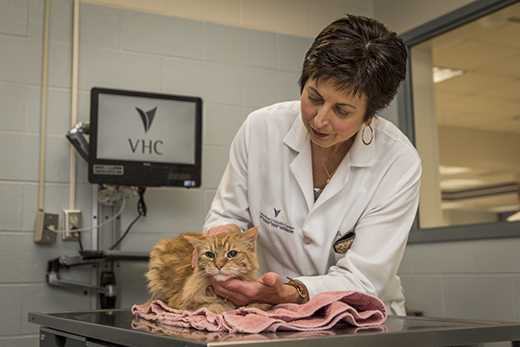Veterinarian clarifies misconceptions about toxoplasmosis, offers safety tips
Wednesday, March 28, 2018

Susan Nelson, veterinarian and clinical professor at Kansas State University, says that proper precautions can help cat owners minimize the risk of contracting toxoplasmosis. | Download this photo.
MANHATTAN — Toxoplasmosis is a disease that can have devastating effects on an unborn child, and many women have been erroneously advised to get rid of their cat if they are pregnant, says Susan Nelson, veterinarian and clinical professor at Kansas State University's Veterinary Health Center.
"Toxoplasmosis is a devastating disease for some but with proper precautions, a woman does not need to rehome her cat if she becomes pregnant," Nelson said.
Toxoplasmosis is a single-celled parasite known as Toxoplasma gondii. It is most commonly found in areas with hot, humid climates and situated in lower altitudes. More than 60 million people in the U.S. may be infected with the parasite and up to 95 percent of people in some areas of the world may be infected, according to the Centers for Disease Control and Prevention. Fortunately, most people with a healthy immune system will experience only mild symptoms if infected. The organism can cause serious health issues for those people who are pregnant or immunocompromised, Nelson said.
Although people can contract toxoplasmosis from cats, the most common ways to acquire the disease include eating and handling raw meat; drinking unpasteurized goat's milk; eating and handling raw vegetables; drinking contaminated water; and gardening. Other less common modes are eating raw or undercooked oysters, mussels and clams.
Toxoplasmosis is most likely to be spread to an unborn child when the mother is infected just before becoming pregnant or during pregnancy. Even though a pregnant woman may not experience any symptoms, the disease can cause miscarriage of the fetus, a stillborn child or severe damage to the eyes and nervous system of the child, which may not develop until later in life. Women can be tested prior to pregnancy to see if they have already been exposed to toxoplasmosis, as transmission of the disease to an unborn child is uncommon in this situation.
Cats are the definitive host for the organism and they are infected by eating rodents, birds or other small animals that are infected with Toxoplasma. The oocysts that cats shed in their feces are capable of infecting people. Cats can shed millions of these microscopic oocysts for up to three weeks after they have been infected.
Treatment options are available for humans and cats with the disease.
Nelson offers the following safety precautions to minimize the risk of contracting toxoplasmosis:
• Ensure the cat litter box is changed daily. It takes one to five days after it is shed in a cat's feces for the Toxoplasma parasite to become infective. If you are pregnant or immunocompromised, avoid changing cat litter if possible. If no one else can perform the task, wear disposable gloves and wash your hands with soap and water afterward.
• Keep cats indoors so they cannot hunt and eat rodents, birds and small animals.
• If pregnant, do not adopt or handle stray cats, especially kittens, as they are at a higher risk of shedding the organism. Do not get a new cat while you are pregnant as it may be shedding the organism at time of adoption.
• Feed cats only canned or dried commercial food or well-cooked table food, not raw or undercooked meats.
• Keep your outdoor sandboxes covered so cats cannot defecate in them.
• Make sure meats are cooked to recommended safe temperatures and freeze meats at subzero temperatures — 0 degrees Fahrenheit — for several days before cooking.
• Peel or wash fruits and vegetables thoroughly before eating, and do not eat raw or undercooked oysters, mussels or clams.
• Do not drink unpasteurized goat's milk and do not feed this to cats as well.
• Wash cutting boards, dishes, counters, utensils and hands with hot soapy water after contact with raw meat, poultry, seafood, or unwashed fruits or vegetables.
• Wear gloves when gardening and during any contact with soil or sand that could be contaminated with cat feces that contain Toxoplasma. Remember to wash hands with soap and water after gardening or if they come in contact with soil or sand.
• Teach children the importance of washing hands to prevent infection.
